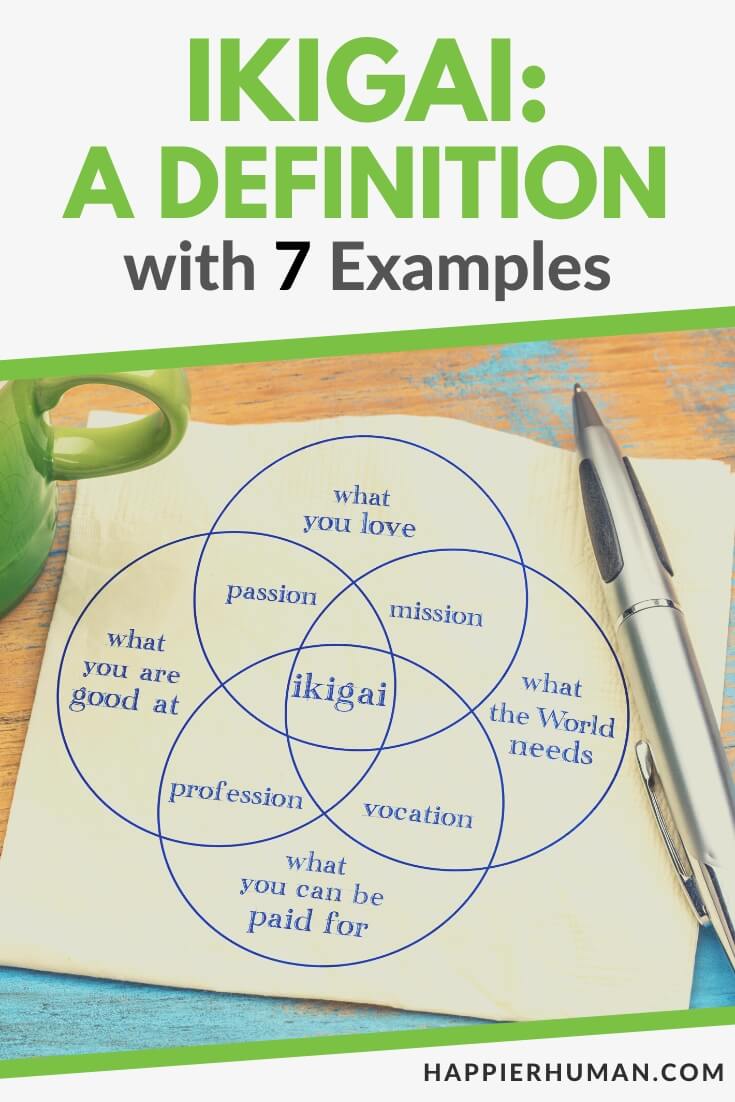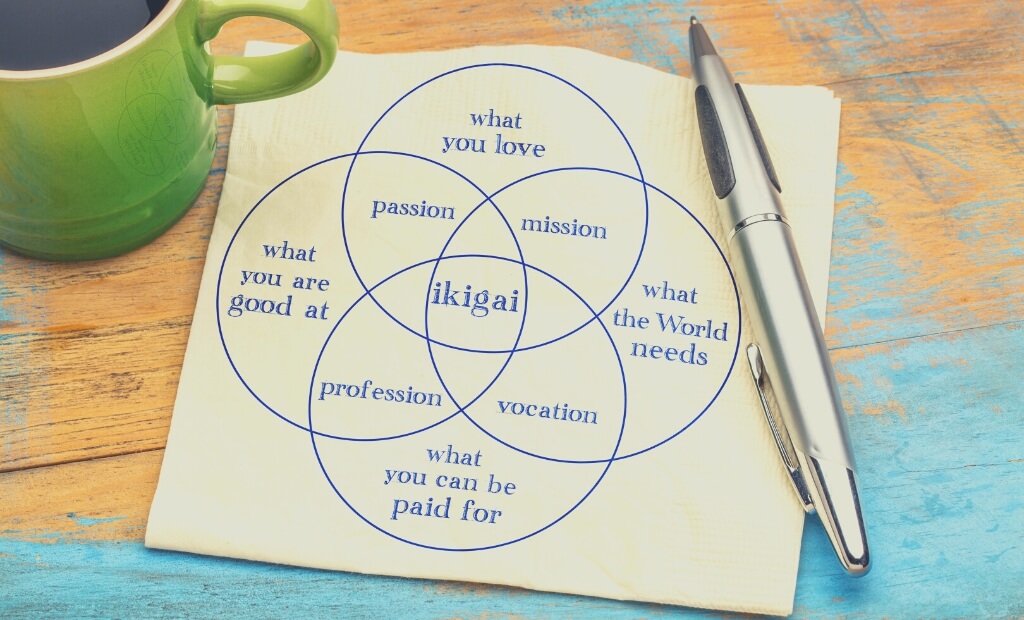Are you looking for meaning in your life or want a purpose? Do you think your life’s purpose needs to be something grand and extraordinary? Something you quit your job for and go on an epic quest or adventure to find?
But then you feel disappointed and depressed when your grandiose dreams about your purpose don't come true. All because the dreams to find your purpose aren’t based in reality.
Or maybe you do achieve your dreams, only to discover you don’t feel fulfilled by all the money and status you’ve gained.
These “purpose of life” goals are empty and, honestly, unsustainable.
I want to challenge you to dive deeper and find your ikigai. I promise, it’s not an icky guy. The lifestyle concept is pronounced as ee-key-guy and refers to finding your passion and how to live for what adds joy, meaning, and value to your life.
Here’s everything you need to know about the Japanese concept and the best ikigai examples to help you find meaning, joy, value, and purpose.
What Is Ikigai?
Ikigai comes from the Japanese words iki, meaning “life” or “alive,” and gai, meaning “worth” or “benefit.” When you combine iki and gai to form ikigai, it loosely translates to what gives your life meaning, worth, or purpose.
In a sense, you may think that it’s similar to raison d’etre, French for “reason for being,” and you won’t be wrong.
Ikigai can also mean:
There is a significance and depth to the Japanese concept that’s challenging to convey. The term dates back to at least the 14th century.
However, it came to the mainstream attention of the Western world through a 1999 paper published in Age and Ageing, a 2009 TED talk by Dan Buettner on Blue Zones (areas where people live long happy and healthy lives), and a 2016 book, titled Ikigai: The Japanese Secret to a Long and Happy Life by Héctor García and Francesc Miralles.
We are quick to assume that ikigai needs to be something of significance in your life, and by significance, I mean big and lofty. But when you look closely at ikigai in Japanese society, you’ll soon realize that it needn’t be big or lofty. It can be “small” but significant to you.
Ikigai features in daily conversations in Japan, and can be used to refer to that delicious sip of green tea after a hectic morning. “Ahh! My ikigai.”
That’s a “small” and seemingly insignificant ikigai, but it’s joy or valuable in that particular moment. And it’s true and authentic for the person expressing their momentary ikigai.
Ken Mogi, a Japanese neuroscientist and author, says that ikigai is a spectrum, reflecting the complexity of life. It describes your overall subjective well-being, encompassing your happiness, self-esteem, life satisfaction, morale, and an evaluation of your life’s meaning.
You can even see your ikigai as a devotion or passion to live for what you love and a never-ending journey to achieve a sense of fulfillment.
In the words of Ken Mogi in Awakening Your Ikigai: How the Japanese Wake Up to Joy and Purpose Every Day, “Ikigai starts from very small things, like just having a cup of coffee.”
The 4 Aspects of Ikigai
Ikigai comprises four overlapping spheres that include personal and social dimensions of your life.
It’s important to note that while the spheres overlap, finding your ikigai in each sphere isn’t dependent on another sphere, but often, your ikigai is at the intersection of these spheres.
For example, what you love doesn’t necessarily mean you are good at it, it’s what the world needs, or that you earn money from it.
If you find that your “ikigai” is at the intersection of these four spheres but you feel like something is missing, don’t worry.
Keep searching until you find your true ikigai. And remember, you don’t just have one “big” ikigai that’s permanent and fixed; your ikigais are fluid.
The four key aspects to finding and living your ikigai are:
1. Your Passion: What You Love
This sphere relates to what you most enjoy, what makes you feel alive, and what makes you feel fulfilled.
Your passions could be rock climbing, writing, making music, forest bathing, or spending time with your bestie.
2. Your Profession: What You Are Good At
What you are good or great at includes skills you’ve learned, hobbies you practice, and any talents you have.

You may be good at writing poems, public speaking, problem-solving, or being empathic.
3. Your Mission: What the World Needs
The world refers to your community, close family (or inner circle), humanity as a whole, or anything in between. What the “world” needs depends on what you think it needs and any needs that others express(ed).
Examples of what the world needs include clean water, kindness, and services like fire fighting or nursing.
Ikigai here explicitly refers to altruism and doing what’s best for others.
4. Your Vocation: What You Can Get Paid For
Your vocation refers to what you do that earns you money. While it can be what you love, skills you have, or what the world needs, it’s highly dependent on the state of the economy and how in demand your talents or skills are.
What Are the Benefits of Practicing Ikigai?
There are various benefits to practicing ikigai since it’s a journey and way of life. Finding or awakening your ikigai can:
7 Examples of How to Apply Ikigai in Your Life
You have an ikigai, even if you don’t know it – yet. To find your ikigai (or ikigais because you may have more than one), you need time, dedication, and self-reflection.
Remember to start small, find the joy in the little things, and be present in the here and now.
To help you apply this lifestyle concept in your life, here are the best Ikigai examples that gives joy and propels you forward:
1. A Cup of Tea or Coffee
Yes, I’m using Ken Mogi’s example of ikigai, but it is such a fitting ikigai example. When you are feeling down, getting up in the morning for a soothing cup of your favorite tea or coffee blend may be just the motivation you need.
In The Little Book of Ikigai, Mogi writes that “if you make a habit of having your favorite things soon after you get up, dopamine will be released in your brain, reinforcing actions [like getting up] prior to your reward [tea].”
In fact, my ikigai is pretty much every cup of tea I have during the day. Sipping a cup of blueberry tea gives me a moment to pause, breathe, think, and reflect, and I feel ready for the following moments once my cup of delicious tea is finished.
While a cup of java or tea can be something you love, you may find that you have a special talent for making delicious brews, so it can be a vocation and even what your community needs.
This ikigai can be at the intersection of the four spheres in your life, but it can just be something you love and something that’s meaningful to you.
2. Doing for Others
Doing for others is a passion for a lot of people. It can also be their profession, vocation, and mission. When you help other people, whether they are family, in their community, or located somewhere on the other side of the world, you feel like you have a purpose.

Plus, doing for others helps you feel good about yourself, it gives you a sense of belonging, and it helps keep things in perspective for you. It also makes the world a better, kinder, and happier place, making this a perfect ikigai example.
3. Your Loved Ones
Your ikigai can also be the people you love or a special someone. Maybe your mom, soul friend, partner, or kids?
Your loved one(s) can definitely be the reason you wake up and get up in the mornings, and they can be a source of joy and happiness.
You also fulfill the “what the world needs” ikigai sphere when you take care of the ones you love and you show up for them.
I know how a hug from my sister or a visit to or from my folks can be an ikigai moment. How about you? Does seeing your kids grow bring you a sense of purpose, knowing you are mainly responsible for those achievements?
4. Shinrin-Yoku
Another Japanese concept is shinrin-yoku, which means “forest bathing.”
While you can certainly enjoy nature naked (if you have a forest on your private land), shinrin-yoku involves you (clothed) and simply breathing in nature, whether that is a forest, your garden, the top of a mountain, or a local park.
Forest bathing can definitely be your ikigai, and many of the benefits of being out in nature overlap with having a purpose or joy in your life.
De-stress, live longer thanks to a healthier overall well-being, and feel better mentally after breathing in fresh air and enjoying all that nature has to offer.
5. Dancing
Dancing can be your ikigai if you are a professional dancer and it’s your passion. But dancing can be your joy or happiness of being, even if you just dance around your kitchen while making breakfast or enjoy romantic dances with your partner.
If dancing isn’t your style, then any hobby you practice can be your ikigai. It can be singing, writing, cooking, gardening, arts and crafts, and more!
6. Your Pets
Your pets can also be your ikigai. The reason you get up in the morning is to feed them and give them love and attention.
It can be your dog, cat, bird, beardie, goat, emotional support rabbit, or even your horses.

Animals can be a great source of joy, and if this is your passion, it can also be your vocation and mission – especially if you volunteer at animal shelters and animal care organizations and don’t earn money from working with animals.
7. You
You can be a source of your own ikigai too. You can find ikigai when you work on yourself and your healing, and you can simply sit, breathe, and be.
Consider journaling for your self-development, working on your shadow self, meeting the needs of your inner child, or meditating so you can celebrate you and focus on self-love, care, support, and kindness.
You may even find that this becomes your mission, vocation, and profession that you can share with others so they, too, can see the benefits of focusing on themselves as an ikigai.
Final Thoughts on Ikigai Examples
Your ikigai can be something huge, such as achieving your dream of running a Fortune Global 500 company, but it can also be what most people consider as small and insignificant. Except, your ikigai is never insignificant.
It’s meaningful to you, and that’s all that matters.
Some of the best ikigai examples include your pets, loved ones, forest bathing, and something delicious (just for you) in the morning like a cup of tea. But it can also be running marathons, building homes in less developed countries, teaching, or dancing.
Learn about the Danish lifestyle concept of hygge (hoo-gah) and how it can help you live a happy and mindful life where you enjoy the little and quiet pleasures life has to offer.
Or, learn about how to live a more purposeful life with these 7 steps.
And if you want more articles on finding your life purpose, be sure to read the following articles:
- 11 Steps to Stop Living in the Past and Move Forward
- 5 Simple Steps to Find Your Life Purpose
- 11 Things to Do When You’re Feeling Lost in Life
Finally, if you want a simple way to reduce your stress and anxiety, then try writing these 35 mindfulness journaling prompts to live more in the present moment.


